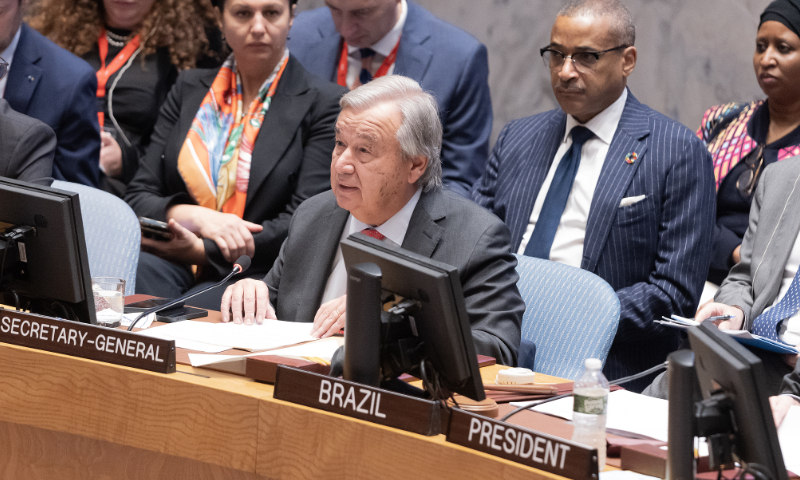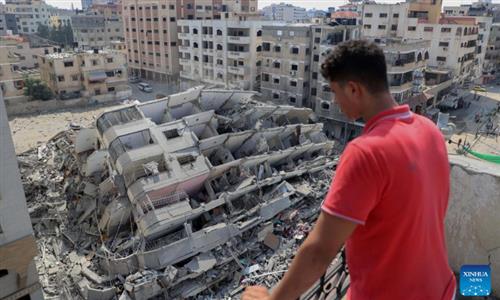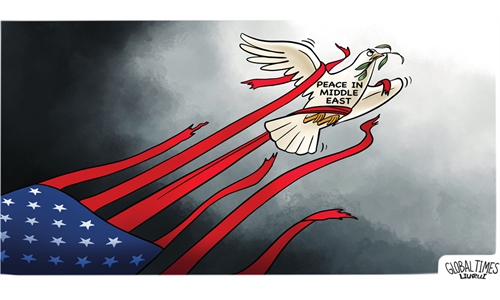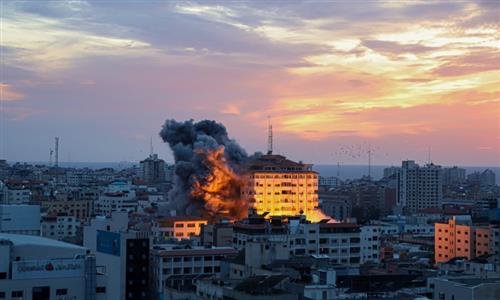Supporting UN in playing a greater role in Israeli-Palestinian issue is crucial: Global Times editorial

Secretary-General Antonio Guterres speaks during the UN Security Council meeting on the situation in the Middle East at UN Headquarters in New York on October 24, 2023. Photo: VCG
The humanitarian crisis in the Gaza Strip is still worsening. The latest diplomatic dispute between Israel and the United Nations (UN) over the statement made by Secretary-General Antonio Guterres has further complicated international efforts to address the urgent humanitarian crisis in Gaza. During the public debate on the Israeli-Palestinian issue held by the United Nations Security Council (UNSC) on October 24, Israel not only demanded that Guterres should resign "unless he apologizes immediately" due to dissatisfaction with his speech, but also stated that they would refuse to issue visas to UN representatives, claiming "the time has come to teach them a lesson." The latest reports indicate that Israel has already rejected the visa application of Martin Griffiths, Under-Secretary-General for Humanitarian Affairs.
What has angered Israel is the remarks made by Guterres, saying "the attacks by Hamas did not happen in a vacuum … The Palestinian people have been subjected to 56 years of suffocating occupation." Looking at this statement from a neutral standpoint, it's a factual statement, stemming from an understanding of the complex historical context of the Israeli-Palestinian conflict. People can see that it does not imply support for Hamas' attacks.
In fact, Guterres promptly and unequivocally condemned Hamas' attacks. In his remarks on October 24, he mentioned that "the grievances of the Palestinian people cannot justify the appalling attacks by Hamas," and also stated that "those appalling attacks cannot justify the collective punishment of the Palestinian people." Furthermore, Guterres' speech primarily emphasized the paramount principle of protecting civilians, the urgent need for an immediate humanitarian ceasefire, and the fact that the only realistic foundation for peace and stability in the Middle East that the world cannot ignore is the "two-state solution." According to a reporter from Al Jazeera who was present, many countries welcomed Guterres' speech and considered it to be "very balanced."
The Israeli-Palestinian issue has a complex historical context, and different perspectives often lead to very different conclusions, which is quite normal. Israel, as a party to the conflict, has its own stance and views, and it certainly has the right to express its opinions. However, there are boundaries to such expressions. Respecting and upholding the authority of the UN is one of these boundaries. Especially in the current situation, the Israeli-Palestinian conflict is causing significant civilian casualties every day, including many women and children. The situation is extremely urgent, and at such a time, it is even more necessary to form a united front at the UN level.
Since the conflict began, although the UNSC has not yet reached a resolution on the Israeli-Palestinian issue due to repeated oppositions from the US, still in areas such as the delivery of relief supplies through the Rafah border crossing and humanitarian relief efforts in Gaza, UN agencies have played an undeniable role. The UN General Assembly is set to resume its 10th Emergency Special Session on the situation in Israel and Palestine on October 26, and although negotiations in the UNSC regarding the Israeli-Palestinian issue have faced difficulties, they are ongoing. In the current situation, the UN remains the most significant platform to bring together voices of various parties and has the best potential for forming a common international stance and action plan. Many countries, including Western allies of the US, acknowledge that a lasting and just solution to the Palestine issue ultimately relies on the "two-state solution" based on UN resolutions.
Therefore, from any perspective, the authority of the UN must be upheld, and even in the context of the Israeli-Palestinian issue, UN should be supported to play a greater role. The recent attitudes of Israel toward Guterres, as well as the unilateral actions of the US at the UN and their refusal to support a consensus on a ceasefire, highlight one of the root causes of the prolonged Israeli-Palestinian conflict: the failure to implement and enforce UN resolutions. From the principle of a permanent two-state solution based on the 1967 borders to the promotion of a peace treaty, the UN has consistently maintained a clear stance and issued explicit resolutions on the Israeli-Palestinian issue. Unfortunately, these have not received the attention they deserve, and the recent tragedy once again underscores the need for all parties to respect the authority of the UN.
In fact, whether for Israel or the US, upholding the authority of the UN and supporting the UN to play a greater role in the Israeli-Palestinian issue is beneficial and harmless. The US' "war on terror" for the past 20 years has demonstrated that collective punishment does not alleviate extremism; it instead perpetuates a cycle of violence. The fact will prove that the proper solution to the Israeli-Palestinian issue lies in promptly reconvening an international peace conference within the framework of the UN, based on the "two-state solution," in order to break the cycle of violence.



